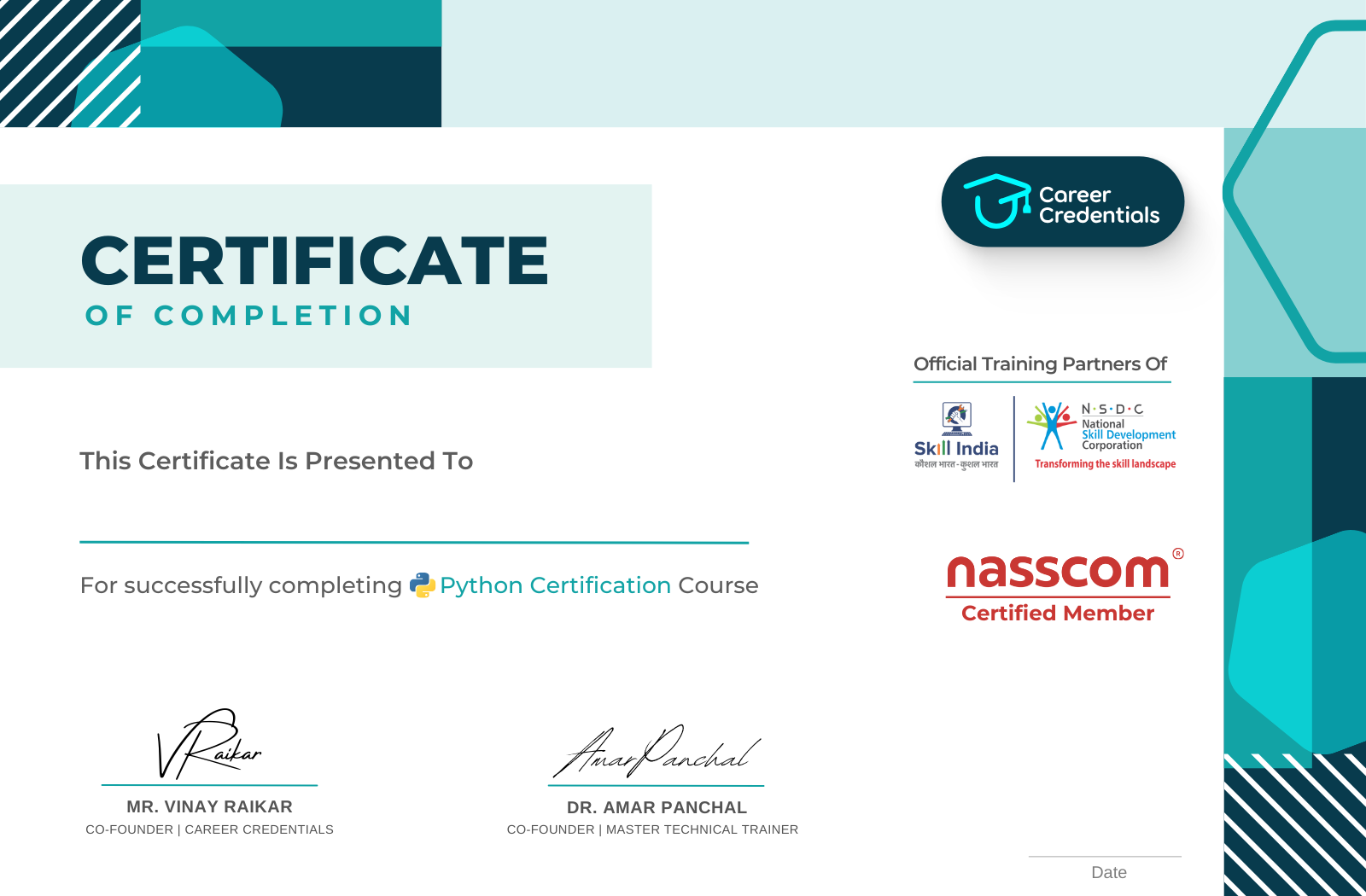Data Science Fundamentals with Python: Mastering Machine Learning Concepts
What Will You Learn?
In this Data Science with Python course, you’ll begin by mastering the core concepts of data analysis, starting with Python basics and moving on to powerful libraries like Pandas, NumPy, and Matplotlib. You’ll learn how to clean, preprocess, and visualize data to uncover key insights. The course covers essential statistical concepts and dives into machine learning techniques, including regression, classification, and clustering, as well as advanced topics like natural language processing (NLP).
You’ll also gain hands-on experience with 4 industry-level projects, These projects will allow you to apply your learning to real-world scenarios, building your portfolio and demonstrating your ability to solve complex data science problems.
Through 11 comprehensive modules and guided by Dr.Amar Panchal, you’ll develop a solid understanding of data science, backed by practical experience, preparing you for success in the field.
Course Flow
The Data Science with Python course starts with core concepts, including Python basics, data collection, and preprocessing techniques. You’ll then explore data visualization and statistical analysis, using tools like Pandas, Matplotlib, and Seaborn to gain insights. The course dives into machine learning algorithms, covering regression, classification, and clustering, along with model evaluation and tuning.
This foundation leads into four real-world projects: Predictive Sales Analysis, Customer Segmentation, Lorenz System Visualization, and Fraud Detection. Guided by Dr. Amar Panchal, these projects provide hands-on experience with industry-relevant techniques. Additionally, independent assignments reinforce key concepts, ensuring you’re ready for practical applications in data science.
Data Science Syllabus
Module 1: Introduction To Data Science & Analytics
- Introduction to Data Science
- Overview of Data Analytics and its applications
- Understanding the Data Science Workflow
- Introduction to Data Visualization
Module 2: SQL For Data Analysis
- Introduction to Relational Databases and SQL
- Data Manipulation with SQL
- Aggregating and Grouping Data
- Querying and Filtering Data
- Joins and Subqueries
Module 3: Big Data Engineering
- Hadoop Ecosystem (HDFS, MapReduce)
- Apache Spark for Big Data Processing
- Distributed Data Processing with Spark
- Handling Big Data with Spark SQL
Module 4: Advanced Excel For Data Analysis
- Advanced Functions and Formulas in Excel
- Data Cleaning and Transformation
- Pivot Tables and Data Visualization
- Data Analysis Tools in Excel
Module 5: Data Visualization With Power BI And Tableau
- Introduction to Data Visualization
- Creating Interactive Dashboards with Power BI
- Visualizing Data with Tableau
- Design Principles for Effective Visualizations
Module 6: Python Programming For Data Science
- Introduction to Python Programming
- Data Manipulation with Pandas
- Data Visualization with Matplotlib and Seaborn
- Handling Data in NumPy
- Data Analysis with Python
Module 7: Machine Learning
- Introduction to Machine Learning
- Supervised Learning (Regression, Classification)
- Unsupervised Learning (Clustering, Dimensionality Reduction)
- Model Evaluation and Selection
Module 8: Deep Learning And Neural Networks
- Introduction to Deep Learning
- Artificial Neural Networks
- Convolutional Neural Networks (Computer Vision)
- Recurrent Neural Networks (Natural Language Processing)
- Transfer Learning and Model Deployment
Module 9: Natural Language Processing (NLP)
- Introduction to NLP
- Text Preprocessing and Tokenization
- Sentiment Analysis and Text Classification
- Named Entity Recognition
- Text Generation with RNNs
Module 10: Computer Vision And Image Processing
- Introduction to Computer Vision
- Image Processing Techniques
- Object Detection and Recognition
- Image Segmentation
- Face Recognition
Module 11: Time Series Analysis
- Introduction to Time Series Data
- Time Series Visualization and Decomposition
- Forecasting Techniques (ARIMA, SARIMA)
- Evaluating Time Series Models
- Time Series Anomaly Detection
Data Science Projects
Project 1: Predictive Sales Analysis
- Apply regression techniques to predict future sales based on historical data.
- Hands-on with data preprocessing, feature engineering, and regression models to forecast sales trends.
Project 2: Customer Segmentation
- Use clustering techniques to segment customers based on their purchasing behavior.
- Implement K-Means or DBSCAN clustering algorithms and evaluate the segmentation results to target specific customer groups effectively.
Project 3: Lorenz System Visualization
- Visualize the chaotic behavior of the Lorenz system through dynamic simulations.
- Apply data visualization techniques to interpret the system’s patterns and behavior using Matplotlib and Seaborn.
Project 4: Fraud Detection
- Build a classification model to detect fraudulent activities based on transactional data.
- Implement machine learning algorithms like Logistic Regression or Random Forests, and evaluate the model's performance using accuracy, precision, recall, and F1-score.
What Students Say...
Certifications

Career Credentials
Python Certified

NSDC
National Certification
- Level
Begineer
- Total Enrolled
326
- Duration
3 Months
- Mode
Online
A course by
Material Includes
- Course Syllabus and Video Lectures: Comprehensive course outline and recorded sessions by Dr. Amar Panchal.
- Hands-On Project Kits: Resources and templates for the 4 industry-level projects, covering web development, data analysis, and automation.
Prerequisites
- Basic understanding of programming concepts.
- A computer with internet access for coding and online resources.
- Willingness to learn and apply agile development practices.
Get Expert Career Guidance for Free!!!
Join us on Free 1:1 Counselling session where we provide personalised Career Guidance for Every Student


